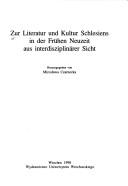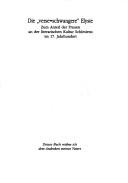| Listing 1 - 8 of 8 |
Sort by
|
Book
ISBN: 8070510005 Year: 1989 Publisher: Brno Státní vedecká knihovna
Abstract | Keywords | Export | Availability | Bookmark
 Loading...
Loading...Choose an application
- Reference Manager
- EndNote
- RefWorks (Direct export to RefWorks)
Moravia (Czech Republic) --- -Silesia (Czech Republic) --- -Schlesien (Czech Republic) --- Slezsko (Czech Republic) --- Periodicals --- -Bibliography --- Silesia (Czech Republic) --- Bibliography. --- -Periodicals --- Schlesien (Czech Republic)

ISBN: 8322917058 Volume: 1968 Publisher: Wroclaw : Wydawnictwo Uniwersytetu Wroclawskiego.
Abstract | Keywords | Export | Availability | Bookmark
 Loading...
Loading...Choose an application
- Reference Manager
- EndNote
- RefWorks (Direct export to RefWorks)
German literature --- Polish literature --- History and criticism --- Silesia --- Schlesien --- Śląsk --- Slezsko --- Intellectual life --- Congresses --- Early modern, 1500-1700 --- 18th century --- Art [German ] --- History --- Art [Modern ] --- Litterature --- Culture --- 20e siecle
Book
ISBN: 8322918410 8322913427 9788322918418 Year: 1996 Volume: 2122 Publisher: Wroclaw : Wydawnictwo Uniwersytetu Wroclawskiego,
Abstract | Keywords | Export | Availability | Bookmark
 Loading...
Loading...Choose an application
- Reference Manager
- EndNote
- RefWorks (Direct export to RefWorks)
Enlightenment --- Silesia --- Intellectual life --- -Aufklärung --- -Schlesien --- Śląsk --- Slezsko --- -Silesia --- Aufklärung --- Eighteenth century --- Philosophy, Modern --- Rationalism --- Schlesien --- Enlightenment - Silesia - Congresses --- Silesia - Intellectual life - 18th century - Congresses --- Siecle des lumieres --- Silesie (pologne) --- Histoire --- Pologne --- 18e siecle

ISBN: 8322914938 Year: 1997 Volume: 1882 Publisher: Wroclaw : Wydawnictwo Uniwersytetu Wroclawskiego,
Abstract | Keywords | Export | Availability | Bookmark
 Loading...
Loading...Choose an application
- Reference Manager
- EndNote
- RefWorks (Direct export to RefWorks)
German literature --- -German literature --- -History and criticism --- Women authors --- History and criticism --- Silesia --- -Schlesien --- Śląsk --- Slezsko --- Intellectual life --- Women and literature --- History and criticism. --- History --- -Intellectual life --- Literature --- Women authors&delete& --- Schlesien --- Early modern, 1500-1700 --- Silesie (pologne) --- Vie intellectuelle --- 17e siecle
Book
ISBN: 8322916248 Year: 1997 Volume: 1978 Publisher: Wroclaw : Wydawnictwo Uniwersytetu Wroclawskiego,
Abstract | Keywords | Export | Availability | Bookmark
 Loading...
Loading...Choose an application
- Reference Manager
- EndNote
- RefWorks (Direct export to RefWorks)
Critics --- -Critics --- -German literature --- -Literary critics --- Criticism --- Litterateurs --- Biography --- History and criticism --- Busching, Johann Gustav --- Silesia --- -Schlesien --- Śląsk --- Slezsko --- Intellectual life --- German literature --- Biography. --- History and criticism. --- -Biography --- -Intellectual life --- Literary critics --- Büsching, Johann Gustav, --- Büsching, --- Büschingius, Iohannes Gustavus Theophilus, --- Schlesien --- Büsching, Johan Gustav Gottlieb --- Philologists --- Study and teaching --- History --- 19th century --- Civilization --- Büsching (johann gustav gottlieb)

ISBN: 0312227906 0333731719 Year: 2000 Publisher: Basingstoke Macmillan
Abstract | Keywords | Export | Availability | Bookmark
 Loading...
Loading...Choose an application
- Reference Manager
- EndNote
- RefWorks (Direct export to RefWorks)
Silesia --- Europe, Central --- Europe centrale --- Ethnic relations --- Political aspects --- Politics and government. --- Relations interethniques --- Aspect politique --- Politique et gouvernement --- #SBIB:327.6H02 --- Internationale problemen: bijzondere vraagstukken --- -Silesia --- -Schlesien --- Śląsk --- Slezsko --- #SBIB:003.IEB --- #SBIB:328H27 --- Instellingen en beleid: Midden- en Centraal Europa: algemeen --- Schlesien --- Central Europe --- Political aspects.
Book
ISBN: 8385871055 Year: 1996 Publisher: Katowice Centrum dziedzictwa kulturowego Górnego Ślaska
Abstract | Keywords | Export | Availability | Bookmark
 Loading...
Loading...Choose an application
- Reference Manager
- EndNote
- RefWorks (Direct export to RefWorks)
Fortification --- -Fortification --- -Fortification, Primitive --- Forts --- Military engineering --- Siege warfare --- Aerial photographs --- Dabrowa Basin Region (Poland and Czech Republic) --- -Silesia, Upper (Poland and Czech Republic) --- -Górny Śląsk (Poland and Czech Republic) --- Horní Slezsko (Poland and Czech Republic) --- Oberschlesien (Poland and Czech Republic) --- Schlonzsko (Poland and Czech Republic) --- Silesia, Upper (Poland and Czechoslovakia) --- Upper Silesia (Poland and Czech Republic) --- Antiquities --- -Aerial photographs --- Aerial photographs. --- Silesia, Upper (Poland and Czech Republic) --- Dąbrowa Basin Region (Poland and Czech Republic) --- Fortification, Primitive --- Dąbrowa Basin Region (Poland and Czech Republic) --- Górny Śląsk (Poland and Czech Republic)
Multi
ISBN: 9781108463980 9781108487108 9781108560955 1108463983 1108487106 1108560954 1108604897 1108610641 Year: 2018 Publisher: Cambridge Cambridge University Press
Abstract | Keywords | Export | Availability | Bookmark
 Loading...
Loading...Choose an application
- Reference Manager
- EndNote
- RefWorks (Direct export to RefWorks)
In the bloody twentieth-century battles over Central Europe's borderlands, Upper Silesians stand out for resisting pressure to become loyal Germans or Poles. This work traces nationalist activists' efforts to divide Upper Silesian communities, which were bound by their Catholic faith and bilingualism, into two 'imagined' nations. These efforts, which ranged from the 1848 Revolution to the aftermath of the Second World War, are charted by Brendan Karch through the local newspapers, youth and leisure groups, neighborhood parades, priestly sermons, and electoral outcomes. As locals weathered increasing political turmoil and violence in the German-Polish contest over their homeland, many crafted a national ambiguity that allowed them to pass as members of either nation. In prioritizing family, homeland, village, class, or other social ties above national belonging, a majority of Upper Silesians adopted an instrumental stance towards nationalism. The result was a feedback loop between national radicalism and national skepticism.
History of Germany and Austria --- History of Eastern Europe --- Upper Silesia --- Nationalism --- Silesians --- Nationalism. --- Politics and government. --- History --- Ethnic identity. --- 1800-1999. --- Silesia, Upper (Poland and Czech Republic) --- Europe --- Politics and government --- History of Germany and Austria. --- History of Eastern Europe. --- Upper Silesia. --- History. --- Ethnology --- Consciousness, National --- Identity, National --- National consciousness --- National identity --- International relations --- Patriotism --- Political science --- Autonomy and independence movements --- Internationalism --- Political messianism --- Górny Śląsk (Poland and Czech Republic) --- Horní Slezsko (Poland and Czech Republic) --- Oberschlesien (Poland and Czech Republic) --- Schlonzsko (Poland and Czech Republic) --- Silesia, Upper (Poland and Czechoslovakia) --- Upper Silesia (Poland and Czech Republic)
| Listing 1 - 8 of 8 |
Sort by
|

 Search
Search Feedback
Feedback About UniCat
About UniCat  Help
Help News
News